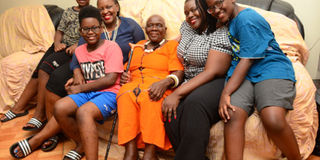I was the first woman in Ankole to go to Makerere

Lilian Birungi Rwakaikara (in orange) with some of her children and grandchildren. Even in her old age, she is still able to assist them with their school work and correct their English. Photo by Michael Kakumirizi .
She transcended the gender bias of her time to reach the highest level in education. She is down to earth, lively and welcoming, and speaks fluent English. At 90, Lilian Birungi Rwakaikara still helps her great grandchildren with their homework.
Fondly referred to by family and friends as Katintini, she explains that the pet name was got from her favourite lullaby as a child.
Background
Born on July 23, 1926 into a polygamous family, she remembers that she had 23 siblings. At the time when Rwakaikara studied, educating girls was not a priority. The popular thinking was that education transformed good girls into mule-headed, high-heel types who would disregard custom and marry late (older than 18) and dare to talk back at men. Rwakaikara studied on scholarships throughout.
My journey to Makerere
“I started kindergarten in 1933 at Mbarara Girls Boarding School up to Primary Six on the Church Missionary Society scholarship. I joined Gayaza High School from 1940 to1942 on the British King George V scholarship. After that, I went to Buloba Teachers’ College (1943-1945) where I completed a teaching course of three years in two years.
When I qualified in 1945, I was selected as one of the two Ugandan African teachers with the late Katikkiro Samuel Wamala’s daughter, Florence Wamala, to go and teach at Gayaza High School.
In 1948, I was transferred to Kyebambe Girls’ Senior Secondary School in Fort Portal and while there, I was chosen to be among 11 women in Uganda to study education for two years at Makerere College, now Makerere University. I was in class with the Late Milton Obote and Prof Ssenteza Kajubi and we were only 11 women in class.
While at Makerere, I attended meetings that were aimed at improving girlchild education and empowerment with some lecturers and other officials from different countries and religious groups.
At Makerere, I was honoured by UNESCO to be an associate member and a pioneer of the National Council of Women of Uganda, which resulted in a scholarship to study in India for three months.
In India, I settled at the Avinashilingam Home Science College at Coimbatore, for a training programme for community development women leaders. I was honoured and was given escorts and guards wherever I went.
Applying my skills
In April 1954, I was chosen to welcome Queen Elizabeth and her husband, President Mugabe and other officials when they came to see Lake Katwe because I could speak fluent English
My role as an agent of social change for women empowerment had crystallised into what could be called an early form of feminism. At home in Ankole, I organised women clubs whom I taught gardening, poultry, writing and reading, scripture, hygiene and handwork such as tailoring, sewing, pottery, making baskets, weaving, beading and embroidery work to earn some money.
With assistance from relatives and organisations like UNESCO, we built a chapel and Mwijutsya Primary Private School in Ruhumba, Kashaari with 64 pupils and five teachers. Poor students got scholarships and some of the beneficiaries became head teachers. Some, like Professor John Ntambirweki, the late Maj Kifuba Mwesigye and Capt Elias Byaruhanga, were able to go up to university from that school.
Unfortunately, it collapsed because of the insecurity brought on by the war. I went back to teaching in government schools and was posted to Matale Primary School in Masaka for a year. I left Masaka for a job as a warden at Mbarara Midwifery and Nursing School where I worked until 1998 when I retired to my home in Rwentojo, Kashaari.
Family commitments
I had my first child in 1954 and had a total of six sons. I never got married because the father of my children disappeared. I was a single mother so I had to toil to educate and look after my sons.
I educated them up to Senior Six, one got a diploma and the others went into business. Four died but two of them left me five grandchildren. Two of my sons are still living and I am privileged to have 18 grandchildren, 15 great grandchildren and one great great grandchild.
I am very proud of my ancestry; my family has produced heroines in Ankole, such as Princess Kibooga and Julia Kibubura. In 1967, I was named “heroine of Ankole” by The Uganda Argus, a government newspaper then.”




